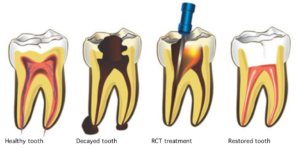A root canal treatment is a series of treatments for an infected pulp. This procedure aims to eliminate the infection and preserve the tooth from microbial invasion. However, this procedure is not without risks. This is why it is important to choose the right dentist for your needs. In addition, you may need root canal treatment several times during your lifetime. Visit Website to learn more about the different types of root canal treatment. This can help you know what you should expect during your appointment.

The first step in root canal therapy is determining the cause of the tooth pain. Several dental conditions can cause tooth pain. For example, a deep tooth infection may need root canal therapy to relieve the discomfort. If you feel pain or discomfort in your jaw, face, or other teeth, you may need root canal treatment. Additionally, your tooth may become painful when hot or cold foods are consumed or when you bite down on ice cream. Sometimes, a tooth that has become infected will fill with pus, causing your gums to swell and become puffy.
After root canal therapy, your dentist will probably recommend a dental crown. This will protect your tooth from further damage. You may experience some sensitivity during the first few days following root canal therapy, but this will subside after the first few days. Your dentist will also give you instructions on caring for your newly treated tooth. A dental crown will be placed over the tooth after root canal therapy. It would help if you also noted that the crown may be sensitive after the treatment, but this will go away once the tooth has healed.
A root canal is an effective way to save an infected tooth and restore its natural look. Because of the intricate layers of teeth, decay may reach the tooth’s inner chambers and necessitate a root canal treatment. With this procedure, your dentist will access the inside pulp and remove the decay to restore the tooth from the inside. You will also be able to keep your natural smile thanks to restoring your teeth and gums.
A root canal treatment is the best option for an infected tooth. It can save your tooth and restore its natural look. The inside structure of your tooth consists of soft, pliable pulp that is protected by a tough enamel. An infection in the pulp means that harmful bacteria can enter this area and spread to the rest of the mouth. Once this happens, a root canal procedure can save your tooth. Besides restoring its appearance, root canal treatment will also restore the tooth’s structure.
A root canal procedure involves removing the soft tissue around the tooth and filling it with a temporary filling. It is a common procedure with little discomfort. Compared to extracting a tooth, a root canal is healthier and more efficient. The procedure is different from a cavity filling and requires no anesthesia. In many cases, the pain associated with a root canal is minimal. A permanent one should last at least five years.
If you have a tooth with a root canal, you may need further cosmetic procedures after the procedure to protect it from future damage. A tooth with a root canal is typically yellowish-white in color. However, in some cases, it may turn grey. A cosmetic dentist can advise you on the best cosmetic procedures to protect your tooth. Aside from a traditional filling, root canal treatment can also involve the removal of a tooth.
In severe cases, root canal treatment may be required to restore your tooth. A dental abscess is a swelling that occurs in the gums. A root canal treatment is the best solution for a dental abscess. A dentist can use a small file to remove the excess pulp. This process can take several hours to complete. The procedure is usually performed on a single tooth, and you may have a temporary filling for two to four days after the procedure.
If your tooth has a root canal, your dentist will perform a root canal treatment to restore the tooth’s structure. In severe cases, you will experience intense pain, a painful infection in the pulp chamber, and problems chewing. You may also experience sensitivity to certain foods or liquids. Once you have a root canal, your dentist will provide you with post-treatment instructions. You will need to take painkillers and a special mouthwash after your procedure to avoid the chance of developing an infection in the future.

